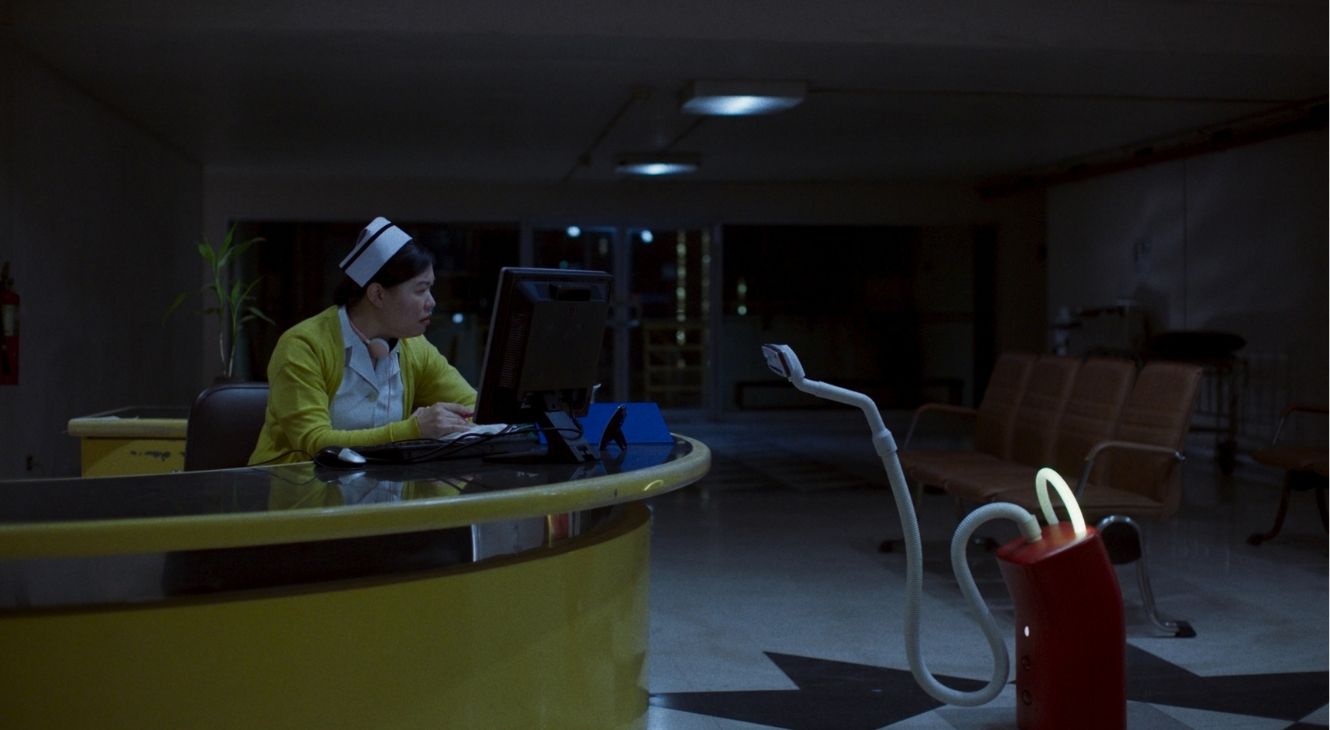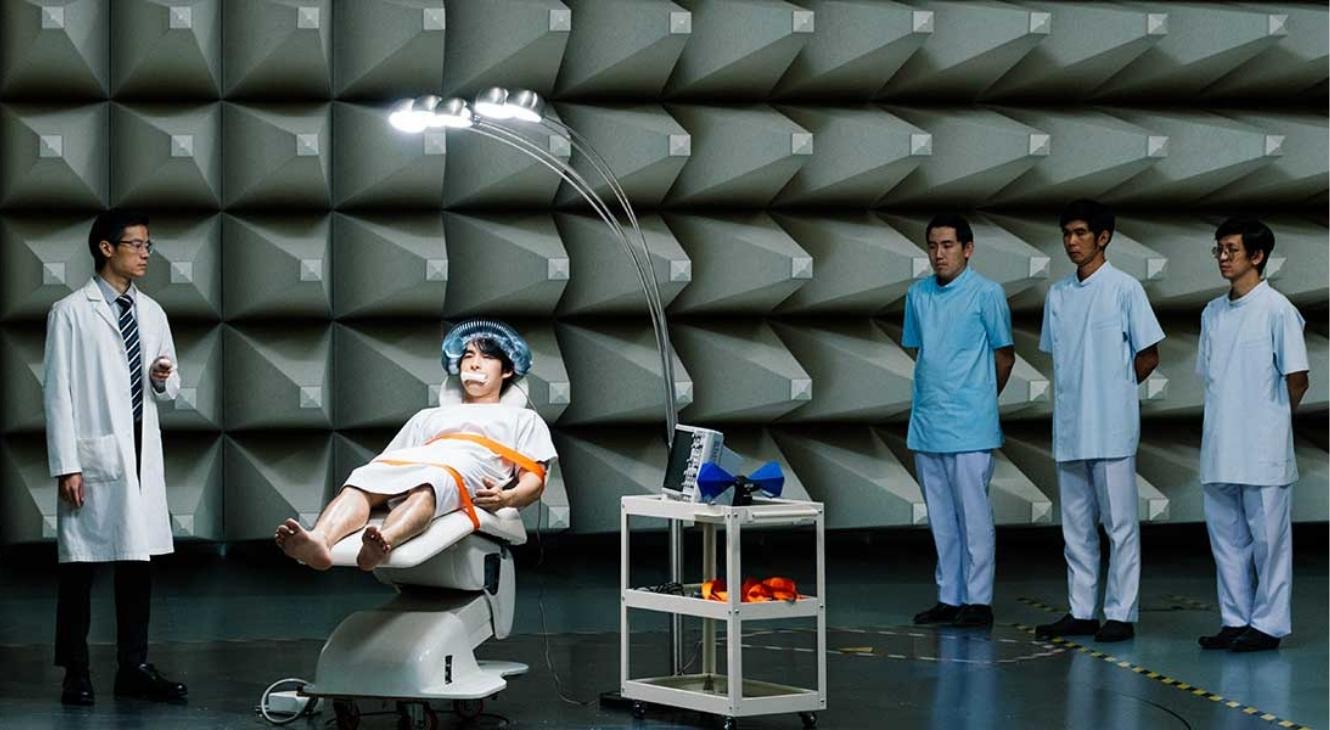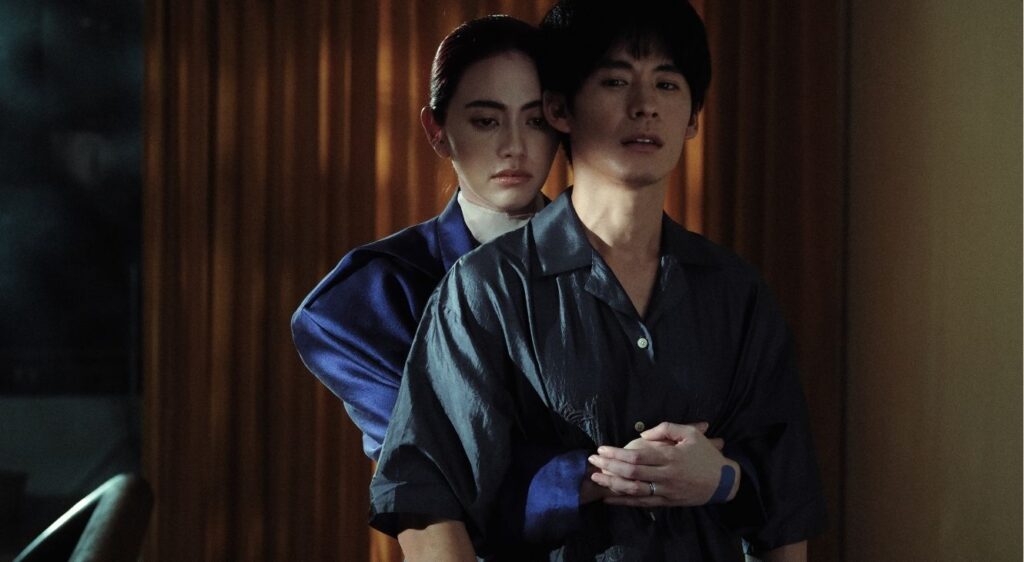The premise of a ghost possessing a vacuum cleaner is enough to spark curiosity. Thai filmmaker Ratchapoom Boonbunchachoke takes this premise and crafts a genre-blending tale in A Useful Ghost (Phi Chaidai Kha), proving that there’s more to explore beyond general hauntings or comedic beats. An underlying social commentary emerges from the depths, tackling oppression, resistance, and the importance of memory. Central to it all is Nat (Davika Hoorne), the titular useful ghost, and an often more entertaining frame story.
An opening featuring an awkward array of art models depicting varying roles and positions in life segues into the frame story, where we are introduced to a self-proclaimed Academic Ladyboy (Wisarut Homhuan) coughing due to dust. This inspires the purchase of a vacuum that ultimately proves to be glitchy, spattering up dust like a man coughing up a lung. The appliance’s failure introduces him to the handsome repairman Krong (Wanlop Rungkumjad), who plunges both the Academic and the viewer into the focal story that is not what it seems.
“The factory is haunted,” says Krong, and the haunting is more than meets the eye. The death of an employee reveals the shaky foundation on which factory owner Suman (Apasiri Nitibhon) finds herself now that her husband is gone. Compounding Suman’s stress is her grieving son, March (Witsarut Himmarat), who can’t let go of his deceased wife, Nat. Nat lives on in his memory, and as a result, her ghost returns to possess a vacuum cleaner and endures an unwelcome return from her in-laws.
Humor and levity keep things light in A Useful Ghost, but never overwhelm.

Some of the more successful gags in A Useful Ghost feature self-moving vacuums (among other appliances), yet there’s also symbolism here. These items are useful yet incredibly disposable, a line that Nat straddles in both life and in the afterlife. Her battle against Suman and the various aunts and uncles who find her ghostly self a nuisance until proven otherwise highlights the disparities in her position, the constant uphill battle she must climb, even in death. It’s why the shift she takes in the film’s second half is particularly damning.
Being found useful and genuinely appreciated are two different things, yet it is easy to see how they might be confused. Through Nat’s journey in Krong’s retelling, her love and desire make her more vulnerable to exploitation by less-than-innocent parties. In pursuit of the things she never had, she forgets herself and ends up being a tool for oppression. In her usefulness, she finds power, but that power distorts and changes who she was before, leading to the character evolving from a general love interest into something more complicated.
What is initially a ghostly love story transforms into something else in A Useful Ghost, and the sparks of humor and levity keep things from easily getting dark. However, when Boonbunchachoke settles into the film’s darkness, it is for good reason. Leading with the quote, “Ghosts come back for two reasons: because they remember or because they are remembered,” Boonbunchachoke explores the importance of memory in both the personal and political spheres, with the erasure of memory being one of the most hauntingly painful occurrences.
While the levity may be what sticks in people’s memories, the underlying emotional devastation lingers in A Useful Ghost. The idea of being forgotten, memories slipping away until all that is left is nothing, these ideas are not new. Yet, Boonbunchachoke blurs genres to emphasize the importance of remembrance. What do we lose when we forget? What do we gain when we remember? Through Nat, March, Krong, and our leading Academic, Boonbunchachoke shows us, with the cast’s performances hammering it all home.
Memories keep ghosts alive, but A Useful Ghost asks what happens when they are erased.

Nat and March have more intensive arcs, and Davika Hoorne and Witsarut Himmarat match them in kind. Their relationship is unbalanced, with one making allowances for the other in some capacity. Himmarat, in particular, utilizes his body language to capture the toll of everything his body endures, almost becoming a ghost of himself in the process. As Nat, Davika Hoorne is less physical in scale, but carries a great deal of complexity in her eyes when confronted with dubious decisions.
Despite their story being the central focus, the frame piece featuring our Academic Ladyboy and Krong add a breath of fresh air in A Useful Ghost. Wisarut Homhuan, in particular, is a delight to watch onscreen, knowing full well how to milk each comedic beat between him and Wanlop Rungkumjad. Even when things get somber, there’s always a moment of humor delivered by Homhuan that keeps things from descending too quickly.
Even still, there are moments where A Useful Ghost spreads itself too thin. The framing story allows us to breathe and laugh, but also interrupts the flow. When the two stories eventually converge, it’s a little too late in the film to make a difference in the pace, as events barrel towards a mighty climax (and not the sexual kind we do end up seeing in the film). Juggling between stories, dreams, and genres gives way to bloat. However, it’s not enough to detract from what is otherwise a solid, hilarious, yet also profound tale.
A Useful Ghost is more than its comedic-enriched premise. Underneath the comedy lies, firstly, a love story wrapped in haunted trappings, followed by a more overarching story that tackles oppression and the power of memory. When memories disappear, what do we lose? Sometimes the greatest acts of resistance are simply remembering.
A Useful Ghost played as a part of the 2025 Toronto International Film Festival (TIFF). The film will be released in theaters nationwide January 16, 2026.
A Useful Ghost
-
Rating - 7.5/107.5/10
TL;DR
A Useful Ghost is more than its comedic-enriched premise. Underneath the comedy lies, firstly, a love story wrapped in haunted trappings, followed by a more overarching story that tackles oppression and the power of memory.







